South Lakes fracking plan 'could ruin our beautiful countryside' says MP

A government report suggesting the potential to open up parts of Cumbria to fracking has brought about a stinging rebuke from South Lakes MP Tim Farron.
A Government report into the potential for fracking in the UK has highlighted new areas in Cumbria that could be used for the extraction of shale gas. The report, carried out by Amec for the Department of Energy and Climate change, seeks to quantify the potential for fracking and suggests that up to 60 per cent of UK land could be used. The report comes at the same time as thousands of local residents have received formal letters from the Land Registry after landowners sought to claim ancient manorial rights to mineral deposits beneath their homes, prompting deep concern throughout the south Lakes community.
Tim said: "I am afraid the Government has seen flashing pound signs, and has not considered the long-term threats fracking poses to the countryside and to environment as a whole. Shale gas is a fossil fuel, and given that we should be aiming to reduce carbon emissions it would be very wrong to now open up another source of carbon to meet our short term energy needs - especially given the enormous and untapped opportunities in tidal energy. To consider fracking in South Lakeland would be especially wrong given that we have some of the most important landscape in the country here. I'm also concerned about the uncertainties over the potential geological impact.
"To drill for shale gas here would be staggeringly damaging and short-sighted, and we would all be left to live with the consequences."
